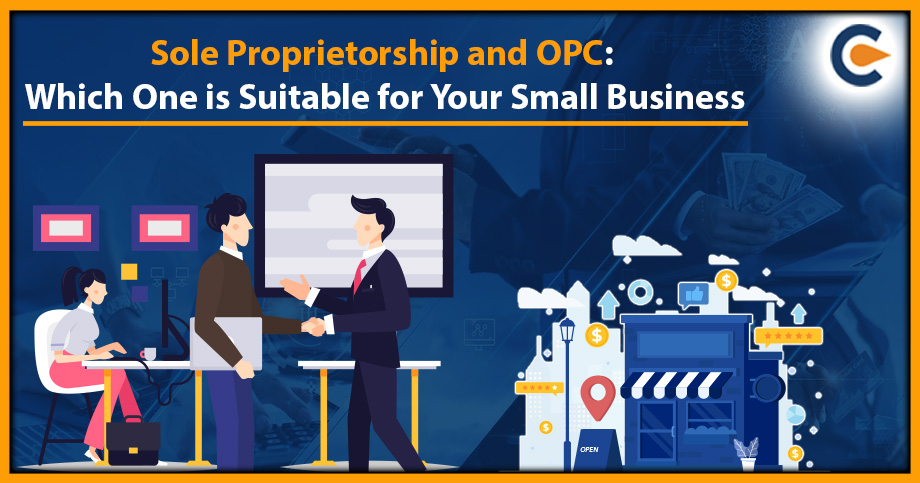Starting a small business can be both exciting and overwhelming. One of the most vital decisions that you’ll need to make when starting your business is choosing the right business structure. The 2 most popular business structures for small businesses are sole proprietorship and OPC. In this blog, we’ll discuss the differences between sole proprietorship and OPC & help you choose the right one for your small business.
What is Sole Proprietorship and OPC?
Lets discuss the meaning of Sole Proprietorship and OPC:
- Sole Proprietorship:
A sole proprietorship is a business structure where the business is owned and operated by one individual. This is the simplest and most common form of business ownership. In a sole proprietorship, the owner is responsible for all the business’s liabilities and debts. The owner also takes all the profits and losses of the business. In legal terms, the owner and the business are considered one and the same.
- One Person Company (OPC):
A one person company (OPC) is a business structure that was introduced in India in 2013. It is designed to provide small business owners with the benefits of a private limited company without having to go through the hassle of incorporating a company with a board of directors. In a One Person Company, there is only one shareholder who is also the director of the company. The shareholder has limited liability, which means that their personal assets are not at risk in case the business fails.
Differences Between Sole Proprietorship And OPC
- Legal Structure: The main difference between a sole proprietorship and an OPC is their legal structure. A sole proprietorship isn’t a separate legal entity from its owner, while an OPC is a separate legal entity from its owner.
- Liability: In a sole proprietorship, the owner is personally liable for all the business’s debts and obligations. This means that if the business fails to repay a loan, the owner’s personal assets may be at risk. In an OPC, the owner has limited liability, which means that their personal assets are not at risk if the business fails.
- Ownership: In a sole proprietorship, the business is owned and operated by one individual. In a One Person Company, there is only one shareholder who is also the director of the company.
- Compliance Requirements: A sole proprietorship is not required to comply with many legal formalities, unlike an OPC. An OPC has to comply with legal formalities like holding board meetings, filing annual returns[1], and maintaining statutory registers.
- Taxation: A sole proprietorship is taxed as per the individual tax slab of the owner, while an OPC is taxed as per the corporate tax rate.
Choosing the Right Business Structure For Your Small Business
Choosing the right business structure for your small business can have a significant impact on your business’s success. Here are some vital factors to consider when choosing between sole proprietorship and OPC:
- Liability: If you are concerned about personal liability, an OPC is a better option. An OPC provides limited liability protection to its owner, which means that their personal assets are not at risk if the business fails.
- Compliance Requirements: If you do not want to be burdened with legal formalities, a sole proprietorship may be a better option. A sole proprietorship has fewer compliance requirements, which means that you will have more time and resources to focus on growing your business.
- Taxation: If you want to take advantage of lower tax rates, an OPC may be a better option. An OPC is taxed as per the corporate tax rate, which is generally lower than the individual tax slab rate.
- Expansion Plans: If you have plans to expand your business in the future, an OPC may be a better option. A One Person Company has a separate legal entity, which means that it is easier to raise funds and attract investors. It also allows you to bring in more shareholders and directors if you want to expand your business.
- Flexibility: If you want flexibility in your business structure, a sole proprietorship may be a better option. As the single owner of the business, you have complete control over all the decisions and operations. In an OPC, you have to comply with legal formalities and there are restrictions on who can become a shareholder or a director.
- Brand Image: If you want to create a brand image and establish credibility in the market, an OPC may be a better option. A One Person Company has a separate legal entity, which gives it a more professional image and creates a sense of credibility in the market. This can help you attract more customers & clients.
Advantages & Disadvantages of Sole Proprietorship and OPC
Following are the Advantages & Disadvantages of Sole Proprietorship and OPC:
Advantages of Sole Proprietorship
- Easy to set up: Establishing a sole proprietorship is relatively easy and inexpensive. You don’t have to register with the government or file any legal documents.
- Complete control: As the sole owner of the business, you have complete control over all the decisions and operations. You don’t have to consult with any partners or shareholders before making any decisions.
- Tax benefits: Since a sole proprietorship is not a separate legal entity, you don’t have to pay corporate taxes. Instead, you are taxed as per the individual tax slab, which can result in lower taxes.
- Privacy: As a sole proprietor, you don’t have to disclose your financial information or any other details to the public or the government.
Disadvantages of Sole Proprietorship
- Unlimited liability: One of the biggest disadvantages of a sole proprietorship is unlimited liability. This means that the owner is personally responsible for all the debts & obligations of the business.
- Limited access to funds: Since a sole proprietorship is owned and operated by one individual, it can be difficult to raise funds or attract investors. This can limit the growth potential of the business.
- Lack of continuity: A sole proprietorship is dependent on the owner. If the owner dies/becomes incapacitated, the business may come to an end.
Advantages of One Person Company
- Limited liability: The biggest advantage of an OPC is limited liability. The owner has limited liability protection, which means that their personal assets are not at risk in case the business fails.
- Separate legal entity: An OPC has a separate legal entity, which makes it easier to raise funds and attract investors. It also creates a more professional image and can help establish credibility in the market.
- Continuity: Since an OPC is a separate legal entity, it can continue to exist even if the owner dies or becomes incapacitated. This makes it a more stable business structure.
- Tax benefits: An OPC is taxed as per the corporate tax rate, which is generally lower than the individual tax slab rate. This can result in lower taxes and more savings.
Disadvantages of One Person Company
- Compliance requirements: An OPC has to comply with legal formalities like holding board meetings, filing annual returns, and maintaining statutory registers. This can be time-consuming and can require additional resources.
- Limited control: As an OPC owner, you have to comply with legal formalities and there are restrictions on who can become a shareholder or a director. This can limit your control over the business.
- Higher setup costs: Setting up an OPC can be more expensive than setting up a sole proprietorship. You have to register with the government and file legal documents, which can require additional expenses.
Conclusion
When deciding between sole proprietorship and OPC for your small business, it is crucial to carefully evaluate the unique benefits and drawbacks of each structure. As a sole proprietor, you have entire control over your business & can easily set it up with minimal expense, but the unlimited liability means that you are personally responsible for all the debts and obligations of your business. On the other hand, an OPC offers limited liability protection, creates a separate legal entity, and provides more professional credibility, but there are additional compliance requirements and higher setup costs to consider.
To make an informed decision, you should consider a range of factors including your business’s expansion plans, taxation, access to funds, continuity, flexibility, and control. It is important to note that both structures have the potential for success and the structure that is best for you will depend on your unique business needs and goals.
In conclusion, the right business structure for your small business will depend on the specifics of your business and your future goals. Making the right choice will enable you to create a stable and profitable business. It is important to remember that the structure you choose is not set in stone and can be changed as your business evolves. Therefore, it is crucial to continually assess your business’s needs and goals to ensure you have the right structure in place to support your growth and success.
Read Our Article: Procedure For Sole Proprietorship Registration: A Step By Step Guide











